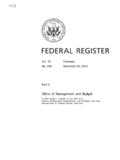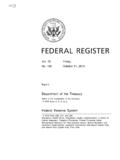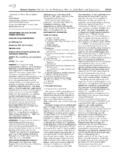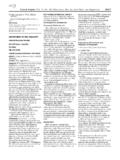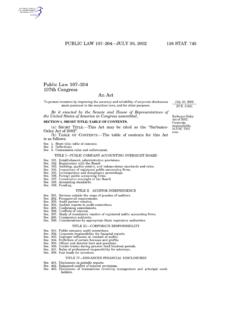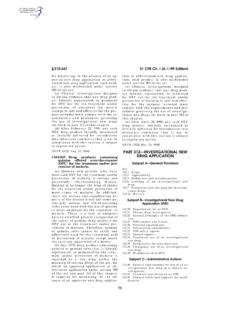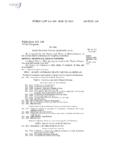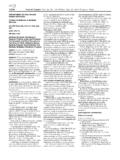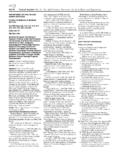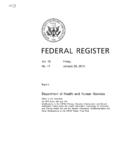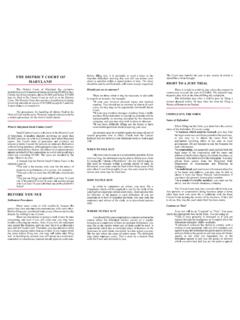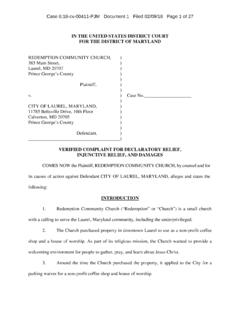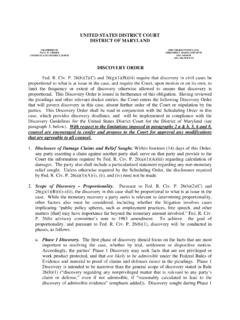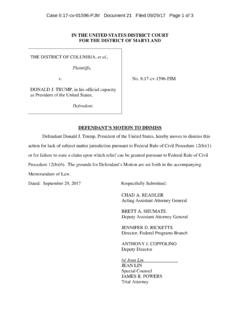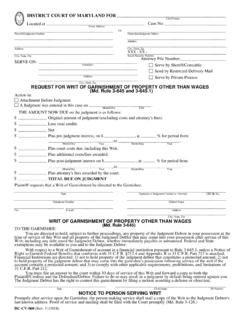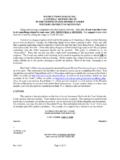Transcription of IN THE UNITED STATES DISTRICT COURT FOR THE DISTRICT OF ...
1 1 IN THE UNITED STATES DISTRICT COURT FOR THE DISTRICT OF maryland ELIZABETH WISEMAN * * Plaintiff, * * v. * Civil Case No. 1:16-cv-04030-SAG * WALMART STORES, INC.
2 , et al. * * Defendants. * * * * * * * * * * * * * * * MEMORANDUM OPINION Defendant Walmart Stores, Inc. ( Walmart ) has filed a Motion in Limine seeking to exclude from evidence Plaintiff Elizabeth Wiseman s ( Plaintiff s ) proffered expert opinion testimony and related medical information.
3 [ECF No. 25]. Plaintiff filed an Opposition and Motion for Leave to File Expert Witness Disclosure, [ECF No. 26], and Walmart filed a Reply thereto, [ECF No. 28]. Walmart has also moved for sanctions against Plaintiff, including attorneys fees, and Plaintiff has opposed the motion. [ECF Nos. 28, 31]. For the reasons set forth below, Walmart s Motion in Limine is DENIED in part and deferred in part; Plaintiff s Motion for Leave to File Expert Witness Disclosure is GRANTED in part and deferred in part; and Walmart s request for sanctions is DENIED. I. BACKGROUND On June 28, 2014, Plaintiff slipped and fell while walking down the detergent aisle of Walmart Store #2290 in Owings Mills, maryland .
4 See Pl. s Compl., [ECF No. 2]. Plaintiff alleges that the fall caused her significant and serious injury. Id. Plaintiff filed a complaint against Walmart in state COURT in November, 2016, and Walmart removed the matter to this COURT soon after. See [ECF No. 1]. Pursuant to a scheduling order, Rule 26(a)(2) disclosures were due Case 1:16-cv-04030-SAG Document 35 Filed 07/05/17 Page 1 of 92 on February 27, 2017 and March 27, 2017 for Plaintiff and Walmart, respectively. [ECF No. 11]. On March 10, 2017, Plaintiff responded to Walmart s discovery requests, and produced, in relevant part, two hundred and thirty-four pages of bills and records relating to Plaintiff s medical treatment.
5 Pl. s Opp., [ECF No. 26-6, 3]. On March 27, 2017, Walmart timely submitted its Rule 26(a)(2) disclosures. [ECF No. 26-11]. Plaintiff, however, failed to submit any expert disclosures until April 27, 2017, two weeks before the discovery deadline, at which time she identified 13 treating physicians as hybrid fact/expert witnesses[.] [ECF No. 26-14]. In contemporaneous correspondence, Plaintiff s counsel informed opposing counsel that Plaintiff only intend[s] to call Dr. Chad Zooker at trial, but [has] noted the other providers to the extent [the parties] are unable to agree to the authenticity and inadmissibility [(sic)] of.
6 Plaintiff s medical bills and records. [ECF No. 26-13]. The instant motion followed. [ECF No. 25]. II. THE LEGAL STANDARD Federal Rule of Civil Procedure 26(a)(2)(A) requires a party to disclose to other parties the identity of any witness it may use at trial to present evidence under Federal Rule of Evidence 702, 703, or 705. Fed. R. Civ. P. 26(a)(2)(A). In addition, Rule 26(a)(2)(B) requires parties to produce written reports for any witness who is retained or specially employed to provide expert testimony in the case or whose duties as the party s employee regularly involve giving expert testimony. Fed. R. Civ. P.
7 26(a)(2)(B). See Sullivan v. Glock, Inc., 175 497, 500 (D. Md. 1997). A report is complete, and compliant with Rule 26(a)(2), if it is sufficiently detailed such that surprise is eliminated, unnecessary depositions are avoided and costs are reduced. Id. at 503 (citations and internal quotation marks omitted). However, as set out in Sullivan, treating physicians are generally considered to be hybrid fact/expert witnesses and [t]o the extent that the source of the facts which form the basis for a treating physician s opinions derive from information learned during the actual treatment Case 1:16-cv-04030-SAG Document 35 Filed 07/05/17 Page 2 of 93 of the patient as opposed to being subsequently supplied by an attorney involved in litigating a case involving the condition or injury then no Rule 26(a)(2)(B) statement should be required.
8 Id. at 501 (emphasis added). For witnesses for whom no written report is required, a party must disclose (i) the subject matter on which the witness is expected to present evidence under Federal Rule of Evidence 702, 703, or 705; and (ii) a summary of the facts and opinions to which the witness is expected to testify. Fed. R. Civ. P. 26(a)(2)(C). See Loc. R. (D. MD. 2016). Additionally, Federal Rule of Civil Procedure 26(e) requires that a party who has made a Rule 26(a) disclosure supplement that disclosure or response if the party learns that in some material respect the disclosure or response is incomplete or incorrect, and if the additional or corrective information has not otherwise been made known to the other parties during the discovery process[.]
9 ] Fed. R. Civ. P. 26(e)(1)(A). [A] party [that] fails to provide information or identify a witness as required by Rule 26(a) or (e), .. is not allowed to use that information or witness to supply evidence on a motion, at a hearing, or at a trial, unless the failure was substantially justified or is harmless. Fed. R. Civ. P. 37(c)(1). Rule 37(c) is self-executing and automatic. See Fed. R. Civ. P. 37(c) advisory committee note (1993). Rule 37(c)(1) also allows the COURT to order payment of reasonable expenses, including attorney s fees, caused by the failure. Id. In Southern STATES Rack and Fixture, Inc.
10 V. Sherwin-Williams Co., the Fourth Circuit articulated five factors that lower courts should consider in determining whether a Rule 37(c)(1) violation was harmless or substantially justified: (1) the surprise to the party against whom the evidence would be offered; (2) the ability of that party to cure the surprise; (3) the extent to which allowing the evidence would disrupt the trial; (4) the importance of the evidence; and (5) the nondisclosing party s explanation for its failure to disclose evidence. Case 1:16-cv-04030-SAG Document 35 Filed 07/05/17 Page 3 of 94 318 592, 596-97 (4th Cir. 2003). The non-disclosing party bears the burden of establishing that its Rule 26(a)(2) violation does not warrant preclusion.
